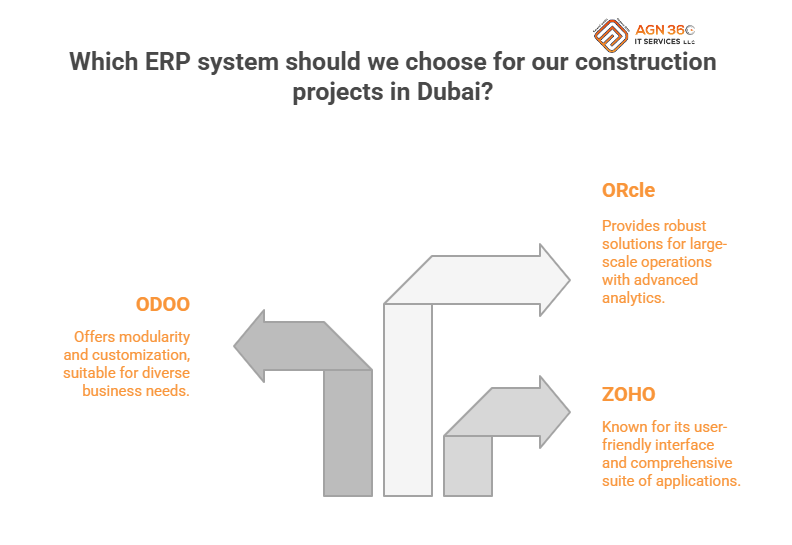




ERP (Enterprise Resource Planning software) for construction is like the brain of a construction business. It brings together every part of a project—from planning and budgeting to materials and manpower—into one simple system. Instead of using five different tools, you get one smart system that does it all.
In the construction industry, ERP helps with:
And when it comes to infrastructure projects, where delays and mistakes can cost millions, having an ERP system isn’t just helpful—it’s critical. It gives you full control, real-time data, and makes sure nothing slips through the cracks.
Whether it’s a small contractor working on a villa or a big company handling roads and towers, ERP software for construction helps reduce errors, control costs, and finish projects faster. It’s like going from a messy toolbox to a fully organized digital command center.
If you’re in Dubai or anywhere aiming for efficiency, choosing the right ERP can make or break your workflow. Construction companies in Dubai often deal with fast timelines, strict budgets, and high standards. So, the ERP software they choose must be both powerful and flexible.

Zoho is the budget-friendly choice that still packs a punch. It’s perfect for small to medium construction companies.
This cloud-based ERP is like the high-tech brain of your business. It’s very customizable, meaning you can mold it to fit your project style.
If you love customizing things your way, Odoo is your dream tool. It’s open-source, meaning developers can tweak it to do almost anything.
Each of these ERP platforms fits different types of construction companies. Some go for depth and analytics like Oracle, others prefer speed and simplicity like Zoho. But all aim to solve the same core challenge—making construction easier to manage.
Feature/Software | Microsoft Dynamics 365 | Oracle NetSuite | Zoho Projects | Odoo ERP |
Project Management |
|
|
|
|
Real-Time Analytics |
|
|
|
|
Mobile Access |
|
| ||
Cloud Support |
|
|
|
|
Best For | Large Construction Firms | Growing Mid-size | Small Contractors | Custom Workflows |
Pricing | $$$ | $$$$ | $ | $$ |
Integration | Excellent (MS Tools) | Excellent (APIs) | Moderate | High |
Not all ERP systems are built the same. A contracting ERP is specially designed to handle what general software cannot. Unlike retail or manufacturing ERPs, this one handles construction contracts, client variations, sub-contractors, and field workers.
Some unique things it does:
Imagine trying to handle a multi-million-dirham road project where 20 teams are working across five sites. A regular software would choke. But with a proper ERP software for construction, you can view live updates, assign tasks, approve invoices, and keep everyone in the loop from a single dashboard.
This kind of ERP isn’t just a helper—it’s your construction project’s second brain. And it’s smart enough to avoid disasters like running out of materials or missing a government deadline.
An ERP system is like a toolbox. The more modules it has, the more problems it can solve. So, what should the best ERP software for construction include?
Here are the must-have modules:
Having these modules helps your business stay organized, saves time, and reduces costly mistakes. Whether you’re laying bricks or managing budgets, a good ERP system keeps everything under one digital roof.
Module / ERP Software | Microsoft Dynamics 365 | Oracle NetSuite | Zoho | Odoo |
Project Management |
|
|
|
|
Budgeting & Estimation |
|
|
|
|
Procurement & Inventory |
|
|
|
|
HR & Payroll |
|
|
|
|
CRM Integration |
|
|
|
|
Document Management |
|
| External needed |
|
Site Management |
|
|
|
|
Adding an ERP software for construction into your company isn’t just a tech upgrade—it can completely transform how you do business. Here’s how:
ERP replaces manual work with automation. No more juggling spreadsheets or paper files. You can instantly generate reports, track tasks, and make quick decisions.
With real-time budgeting and expense tracking, you know exactly where your money is going. You’ll avoid waste, over-ordering, and late fees.
Need to plan six months ahead? ERP systems help you predict material needs, workforce requirements, and future cash flows.
Everyone—from your office staff to your on-site workers—can use the same system. This removes confusion and reduces delays caused by miscommunication.
An ERP system avoids double entries, misplaced documents, and forgotten payments. It’s like having an always-alert assistant who never sleeps.
Construction businesses in Dubai and the GCC have to follow a lot of rules. ERP helps by generating proper records, logs, and audit trails automatically.
Imagine seeing live updates from your job site, tracking delivery trucks, or approving bills from your mobile. That’s the kind of smart decision-making ERP offers.
Let’s look at a real story. A mid-size contracting company in Dubai, building commercial complexes, faced repeated problems—delays, budgeting issues, and miscommunication between teams. They were using Excel, emails, and phone calls to manage everything.
Then, they implemented ZOHO ERP software for construction
Challenges:
What ERP Did:
Results After 6 Months:
Today, they’re scaling their business faster and winning bigger contracts—all thanks to ERP.
DO YOU WANT CUSTOMIZE ERP FOR YOU CONSTRUCTION BUSINESS? CONTACT US NOW!!
Some small construction companies think ERP is only for the large businesses. But that’s not true at all. In fact, smaller firms may benefit even more because they have fewer people juggling many tasks.
Here’s why it works for small teams too:
Small businesses that use ERP software for construction can appear much more professional and win bigger contracts. Plus, they save tons of time and money over the year.
A major benefit of ERP software is how it connects with accounting software. Financial tracking is vital in construction—think of all the invoices, contractor payments, taxes, and supplier bills involved.
Here’s how ERP and accounting software work hand in hand:
Systems like Microsoft Dynamics 365 already have full accounting built-in. For others like Zoho or Odoo, you can connect to accounting platforms like QuickBooks or Xero. This seamless connection keeps both your finance and construction teams happy.
When most businesses hear the word “software,” they immediately think “expensive.” But what if the money you spend now saves you more money every single year?
That’s exactly what ERP software for construction does.
Think of it this way: if you’re using separate tools for accounting, project tracking, and procurement, you’re spending more time—and money—on fixing mistakes, re-entering data, or even hiring extra admin help.
With a good ERP system:
Even if the upfront cost seems high, the long-term return is massive. Plus, you can often pay monthly or per user, which keeps things affordable even for growing businesses.
Some systems even offer modular pricing, so you only pay for what you need—nothing more. Whether you’re a builder, subcontractor, or general contractor, an ERP isn’t a luxury. It’s a smart investment.
Picking the best ERP isn’t like buying a pair of shoes—it’s more like building a house. You need something that fits your company size, project type, and workflow.
Here are a few steps to help you choose the right system:
Start by making a list. What do you struggle with the most—inventory, payroll, budgeting, scheduling? Pick ERP software that solves those problems first.
Know how much you can spend per month or year. Don’t just go for the most expensive option—some cheaper tools offer powerful features too.
Always ask for a live demo. Let your team try it out. The best ERP system is one your team actually enjoys using.
Will the provider help train your staff? Do they offer customer support? Choose a vendor that won’t leave you hanging.
You may be small now, but what about next year? Pick software that grows with your business.
You’ll likely find yourself choosing between:
Even the best tools won’t help if you use them the wrong way. Here are common mistakes companies make when using ERP software:
Avoiding these mistakes ensures you get maximum value from your ERP software for construction.
ERP (Enterprise Resource Planning) software in construction is a tool that connects different parts of your business—like finance, HR, project management, and inventory—into one system. It helps you track costs, schedule tasks, manage resources, and avoid delays. In short, it makes everything easier, faster, and less prone to errors.

AGN IT Services LLC is IT services provider since 2003. Leading partner of Microsoft, AWS, ZOHO, Odoo. Complete End to End cloud technology, IT Solutions and IT Support.
Copyright Ⓒ 2025 “AGN IT Service LLC ” All rights reserved

AGN IT Services LLC is IT services provider since 2003. Leading partner of Microsoft, AWS, ZOHO, Odoo. Complete End to End cloud technology, IT Solutions and IT Support.
Copyright Ⓒ 2025 “AGN IT Service LLC ” All rights reserved